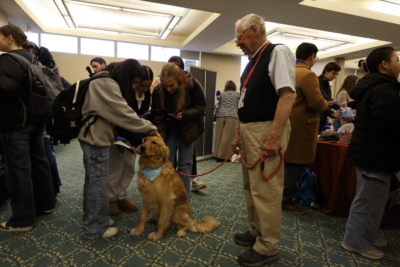As classes began last Wednesday on campus, 38 Goshen College students embarked on an intercultural journey as the spring 2020 Study-Service Term units departed. 17 students made the trek to Tanzania, while 21 departed for Ecuador.
This semester’s unit marks only the second group Goshen College has sent to Ecuador following the switch from Peru. As with the fall semester, the group is led by Andrew Hartzler, professor of accounting, and his wife Ruth. The unit in Ecuador partners with the Cofan Survival Fund, which is a carbon-offsetting partnership.After leading a fall unit of only six students, Hartzler recognizes this semester will necessitate adjustment.
“The group is nearly four times the size of the fall group,” Hartzler said. “This creates numerous logistical challenges that we have been working to overcome, especially with any activity that includes travel. It also requires additional levels of planning for all activities in order to have effective communication between leaders and members of the group.”
At the one-week mark, Nathan Pauls, a junior, said, “This experience is very different from what I imagined, and I am grateful for that. SST is a truly unique experience and something that I’ve found within the first few days is that it cannot be explained: only experienced.”
The students that are a part of the current Tanzania group are the first SST group since the spring of 2017, as the location runs on a three-year cycle. The unit is being run by Jonathon Schramm, professor of sustainability and environmental education, and his wife Katie.
“I think our biggest hopes are to see students forming rich relationships with our Tanzanian hosts and partners and to see them grow in their appreciation for the diversity and wonder of the world,” said Schramm. “We’re also just excited to be learning about this amazing place alongside the students.”
Jan Shetler, director of international education, notes that cross-cultural learning is more important than ever in the current global climate.
“It teaches us to see the world from someone else’s perspective,” said Shetler. “We find ourselves part of families and relationships with people different from ourselves on whom we are dependent while on SST. That is something that has so much potential to change the world!”
Additionally, on November 21, the full faculty approved a number of changes to the international education program. In the coming months, a new set of learning goals will be rolled out that is simplified and includes outcomes for all students.
In the current international SST program, course names and descriptions will be changed. These will align more strongly with what is already happening on SST. The new course titles will include Global Topics, Cultural Perspectives and Community Engaged Learning. Additionally, Global Integration Capstone will replace the Mahara Portfolio.
Goshen College will pilot new courses next year in the move toward a unified SST program where every student will complete SST, whether through the traditional program or dispersed over a number of semesters in the US, Shetler said. These courses include Cultural Perspectives and Community Engaged Learning. Should the full proposal be accepted next year, students will be able to pursue an SST pathway that may include a language class on campus, two immersive courses off-campus, and a global issues capstone class.
“Everyone will be required to do one immersive experiential learning course and one service-learning class whether they go on the international SST program or not,” Shetler said. “The same goals and outcomes will be expected of every student no matter what form of SST they choose.”
Last weekend, SST students In Tanzania and Ecuador, met their host families for the study portion of the semester and have since begun language and culture classes. While the months ahead may prove difficult at times, Shetler says “facing those challenges is necessary to achieve an education that will truly prepare students to live and work as global citizens in today’s world.”
“In my view, SST provides a unique opportunity for learning by stripping away familiar elements: language, culture, mobility, climate, family and friends,” said Hartzler. “By taking away these things, students are driven to reflect on what their strengths and weaknesses are in ways they have not perhaps previously done. The transformation that takes place on SST hopefully produces confidence and a higher degree of certainty among students regarding what elements of life are most important to them as they continue towards full adulthood.”


